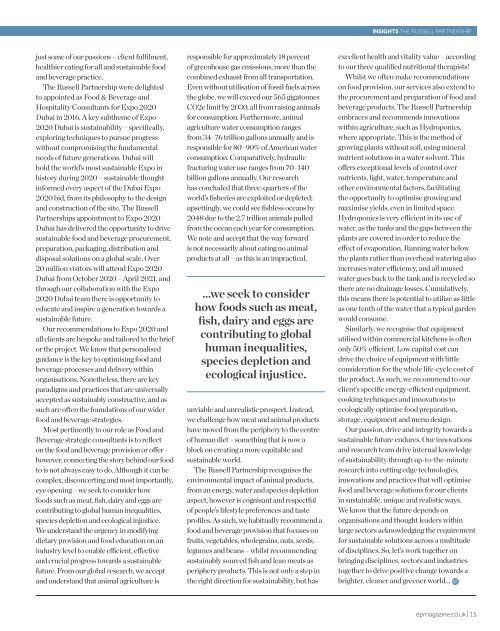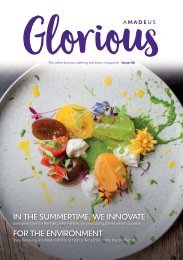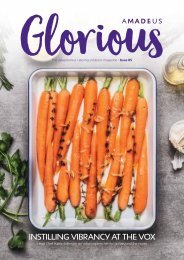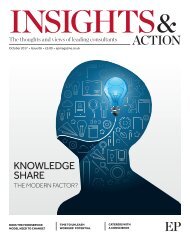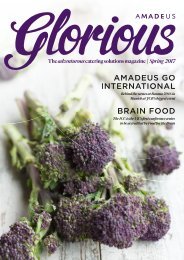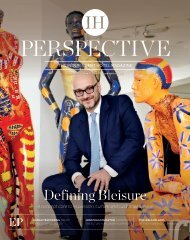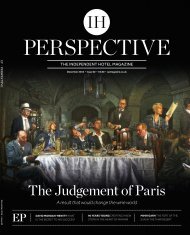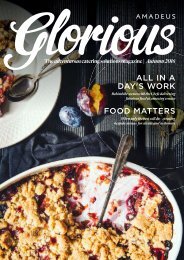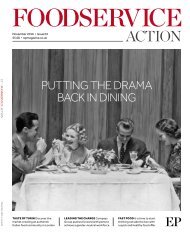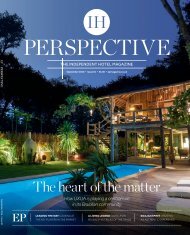EP Food Service Action Issue
Food Service Action focuses on key issues such as food trends, consumer tastes, nutrition and healthy eating, new wines and beverages, changing nature of restaurants and events and features with leading industry players.
Food Service Action focuses on key issues such as food trends, consumer tastes, nutrition and healthy eating, new wines and beverages, changing nature of restaurants and events and features with leading industry players.
Create successful ePaper yourself
Turn your PDF publications into a flip-book with our unique Google optimized e-Paper software.
INSIGHTS THE RUSSELL PARTNERSHIP<br />
just some of our passions – client fulfilment,<br />
healthier eating for all and sustainable food<br />
and beverage practice.<br />
The Russell Partnership were delighted<br />
to appointed as <strong>Food</strong> & Beverage and<br />
Hospitality Consultants for Expo 2020<br />
Dubai in 2016. A key subtheme of Expo<br />
2020 Dubai is sustainability – specifically,<br />
exploring techniques to pursue progress<br />
without compromising the fundamental<br />
needs of future generations. Dubai will<br />
hold the world’s most sustainable Expo in<br />
history during 2020 – sustainable thought<br />
informed every aspect of the Dubai Expo<br />
2020 bid, from its philosophy to the design<br />
and construction of the site. The Russell<br />
Partnerships appointment to Expo 2020<br />
Dubai has delivered the opportunity to drive<br />
sustainable food and beverage procurement,<br />
preparation, packaging, distribution and<br />
disposal solutions on a global scale. Over<br />
20 million visitors will attend Expo 2020<br />
Dubai from October 2020 – April 2021, and<br />
through our collaboration with the Expo<br />
2020 Dubai team there is opportunity to<br />
educate and inspire a generation towards a<br />
sustainable future.<br />
Our recommendations to Expo 2020 and<br />
all clients are bespoke and tailored to the brief<br />
or the project. We know that personalised<br />
guidance is the key to optimising food and<br />
beverage processes and delivery within<br />
organisations. Nonetheless, there are key<br />
paradigms and practices that are universally<br />
accepted as sustainably constructive, and as<br />
such are often the foundations of our wider<br />
food and beverage strategies.<br />
Most pertinently to our role as <strong>Food</strong> and<br />
Beverage strategic consultants is to reflect<br />
on the food and beverage provision or offer –<br />
however, connecting the story behind our food<br />
to is not always easy to do. Although it can be<br />
complex, disconcerting and most importantly,<br />
eye opening – we seek to consider how<br />
foods such as meat, fish, dairy and eggs are<br />
contributing to global human inequalities,<br />
species depletion and ecological injustice.<br />
We understand the urgency in modifying<br />
dietary provision and food education on an<br />
industry level to enable efficient, effective<br />
and crucial progress towards a sustainable<br />
future. From our global research, we accept<br />
and understand that animal agriculture is<br />
responsible for approximately 18 percent<br />
of greenhouse gas emissions, more than the<br />
combined exhaust from all transportation.<br />
Even without utilisation of fossil fuels across<br />
the globe, we will exceed our 565 gigatonnes<br />
CO2e limit by 2030, all from raising animals<br />
for consumption. Furthermore, animal<br />
agriculture water consumption ranges<br />
from 34–76 trillion gallons annually and is<br />
responsible for 80–90% of American water<br />
consumption. Comparatively, hydraulic<br />
fracturing water use ranges from 70–140<br />
billion gallons annually. Our research<br />
has concluded that three-quarters of the<br />
world’s fisheries are exploited or depleted;<br />
upsettingly, we could see fishless oceans by<br />
2048 due to the 2.7 trillion animals pulled<br />
from the ocean each year for consumption.<br />
We note and accept that the way forward<br />
is not necessarily about eating no animal<br />
products at all – as this is an impractical,<br />
...we seek to consider<br />
how foods such as meat,<br />
fish, dairy and eggs are<br />
contributing to global<br />
human inequalities,<br />
species depletion and<br />
ecological injustice.<br />
unviable and unrealistic prospect. Instead,<br />
we challenge how meat and animal products<br />
have moved from the periphery to the centre<br />
of human diet – something that is now a<br />
block on creating a more equitable and<br />
sustainable world.<br />
The Russell Partnership recognises the<br />
environmental impact of animal products,<br />
from an energy, water and species depletion<br />
aspect, however is cognisant and respectful<br />
of people’s lifestyle preferences and taste<br />
profiles. As such, we habitually recommend a<br />
food and beverage provision that focuses on<br />
fruits, vegetables, wholegrains, nuts, seeds,<br />
legumes and beans – whilst recommending<br />
sustainably sourced fish and lean meats as<br />
periphery products. This is not only a step in<br />
the right direction for sustainability, but has<br />
excellent health and vitality value – according<br />
to our three qualified nutritional therapists!<br />
Whilst we often make recommendations<br />
on food provision, our services also extend to<br />
the procurement and preparation of food and<br />
beverage products. The Russell Partnership<br />
embraces and recommends innovations<br />
within agriculture, such as Hydroponics,<br />
where appropriate. This is the method of<br />
growing plants without soil, using mineral<br />
nutrient solutions in a water solvent. This<br />
offers exceptional levels of control over<br />
nutrients, light, water, temperature and<br />
other environmental factors, facilitating<br />
the opportunity to optimise growing and<br />
maximise yields, even in limited space.<br />
Hydroponics is very efficient in its use of<br />
water, as the tanks and the gaps between the<br />
plants are covered in order to reduce the<br />
effect of evaporation. Running water below<br />
the plants rather than overhead watering also<br />
increases water efficiency, and all unused<br />
water goes back to the tank and is recycled so<br />
there are no drainage losses. Cumulatively,<br />
this means there is potential to utilise as little<br />
as one tenth of the water that a typical garden<br />
would consume.<br />
Similarly, we recognise that equipment<br />
utilised within commercial kitchens is often<br />
only 50% efficient. Low capital cost can<br />
drive the choice of equipment with little<br />
consideration for the whole life-cycle cost of<br />
the product. As such, we recommend to our<br />
client’s specific energy-efficient equipment,<br />
cooking techniques and innovations to<br />
ecologically optimise food preparation,<br />
storage, equipment and menu design.<br />
Our passion, drive and integrity towards a<br />
sustainable future endures. Our innovations<br />
and research team drive internal knowledge<br />
of sustainability through up-to-the-minute<br />
research into cutting edge technologies,<br />
innovations and practices that will optimise<br />
food and beverage solutions for our clients<br />
in sustainable, unique and realistic ways.<br />
We know that the future depends on<br />
organisations and thought leaders within<br />
large sectors acknowledging the requirement<br />
for sustainable solutions across a multitude<br />
of disciplines. So, let’s work together on<br />
bringing disciplines, sectors and industries<br />
together to drive positive change towards a<br />
brighter, cleaner and greener world…<br />
epmagazine.co.uk | 15


